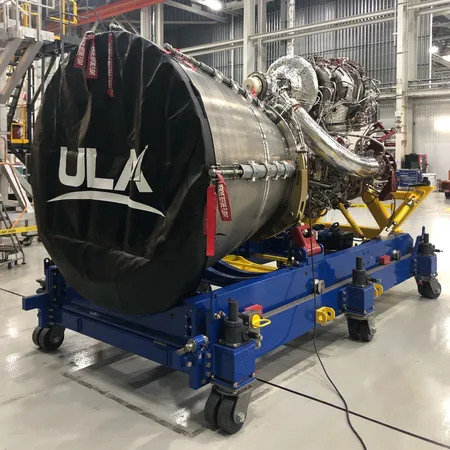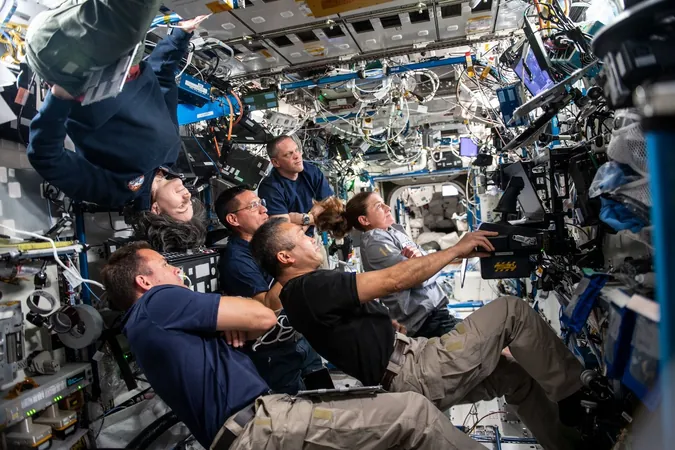
U.S. Space Force Pushes Back Vulcan Rocket Launches to 2025, Sparking Concerns Over National Security Access
2024-11-21
Author: Ming
The U.S. Space Force announced at a recent press briefing that the timeline for launching vital national security payloads aboard United Launch Alliance's (ULA) Vulcan rocket has been delayed to 2025. Lt. Gen. Philip Garrant, head of the Space Force's Space Systems Command, addressed the situation on November 21, highlighting the urgency of reliable access to space amid growing international competition.
Originally set for a 2024 launch, the Vulcan rocket's debut now faces significant setbacks. While Garrant confirmed that ULA's Vulcan is still on track for certification, the second certification launch in October encountered an anomaly with one of its solid rocket boosters, which investigators are currently reviewing. Fortunately, this anomaly is not expected to impede the overall certification process, but the cumulative delays present a worrying challenge for the Space Force.
Currently, the Space Force is heavily reliant on SpaceX's Falcon 9 and Falcon Heavy rockets for national security space launch (NSSL) missions. This dependence raises the stakes for Vulcan's certification, which is essential for meeting the mandated two-provider requirement in the NSSL program. Under the NSSL Phase 2 contract awarded in 2020, ULA and SpaceX were assigned approximately 35 missions. However, ULA has only completed one launch using its existing Atlas 5 rocket, leaving up to 25 launches that Vulcan must conduct by fiscal year 2027.
Two critical missions—USSF-106 and USSF-87—are awaiting launch, with payloads ready but no confirmed dates. ULA had aimed for a November launch of USSF-106, yet the likelihood of achieving a 2024 launch window is dwindling as the year comes to a close.
Despite these challenges, Garrant maintains a cautiously optimistic outlook. "We are working with ULA to evaluate the data from their second flight, and they are making significant progress towards certification," he remarked, emphasizing collaboration between the Space Force and ULA.
Furthermore, the timeline for the upcoming NSSL Phase 3 contracts, expected to allocate funds for the most challenging heavy-lift missions, is also uncertain. The Phase 3 awards, known as Lane 2, will invite participation from up to three providers, which could include ULA, SpaceX, and new player Blue Origin with its New Glenn rocket.
However, Garrant confirmed that finalization of these contracts is contingent upon Congress passing a full appropriations bill for fiscal year 2025, as the Pentagon will not proceed under the current continuing resolution, set to expire on December 20. With political gridlock persisting in Washington, these budget negotiations may delay the awards, further complicating national security space operations.
As the global landscape for space access evolves, the implications of these delays are profound, potentially impacting America’s competitive edge in national defense and space innovation. Stay tuned as the situation develops!





 Brasil (PT)
Brasil (PT)
 Canada (EN)
Canada (EN)
 Chile (ES)
Chile (ES)
 España (ES)
España (ES)
 France (FR)
France (FR)
 Hong Kong (EN)
Hong Kong (EN)
 Italia (IT)
Italia (IT)
 日本 (JA)
日本 (JA)
 Magyarország (HU)
Magyarország (HU)
 Norge (NO)
Norge (NO)
 Polska (PL)
Polska (PL)
 Schweiz (DE)
Schweiz (DE)
 Singapore (EN)
Singapore (EN)
 Sverige (SV)
Sverige (SV)
 Suomi (FI)
Suomi (FI)
 Türkiye (TR)
Türkiye (TR)